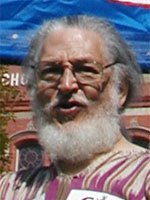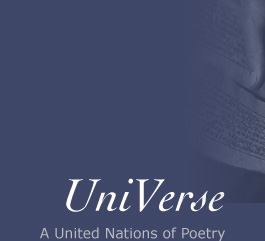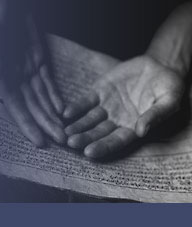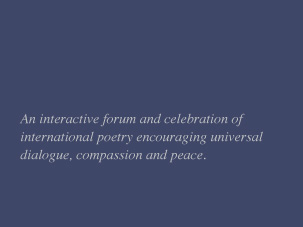| |
 |
 |
 |
 Dennis
Brutus Dennis
Brutus
Known as the "singing voice of the South African Liberation Movement", Dennis Brutus, more than any other single person, was responsible for South Africa’s and Rhodesia’s exclusion from the Olympic Games. In the 1960s and early 1970s Dennis Brutus was a hated figure for those defending sports apartheid. Knowing that if white South Africa was deprived of its fanatical sports devotion it would be forced to change, he helped secure suspension from the Olympics in 1964 and expulsion in 1970.
Political campaigns led to his being banned from all political and social activity. Trying to escape his ban to attend an Olympic meeting in Europe in 1963, he was arrested and subsequently sentenced to eighteen months of hard labor. He was held captive on Robben Island off Capetown, South Africa, where he spent time breaking stones with Nelson Mandela.
Dennis Brutus was born in 1924 in Zimbabwe of South African parents. He attended Fort Hare and the University of Witwaterstand and taught for fourteen years in South African high schools.
After leaving South Africa in 1966 with a Rhodesian passport, Brutus made his home in England. In 1983, after engaging in a protracted legal struggle and appearing on ABC’s Nightline with Ted Koppel, he won the right to stay in the United States as a political refugee. Currently living in the United States, he is now a professor of African Studies and African Literature, and is Chair of the Department of Black Community Education Research and Development at the University of Pittsburgh. He formerly was a tenured professor at Northwestern University, a visiting professor at Swarthmore College, the University of Denver, and the University of Texas at Austin, and was the Distinguished Visiting Humanist at the University of Colorado, Boulder. He was the recipient of the Langston Hughes Award in 1987 (the first non-African American to receive that award) and was honored with the first Paul Robeson Award in 1989, for "artistic excellence, political consciousness and integrity."
Brutus' first collection of poetry, Sirens, Knuckles and Boots (1962), was published in Nigeria while he was in prison. Although Brutus' work is protest poetry, there is a maturity and restraint in his poems that prevent them from ever becoming self-pitying: ". . . all our land is scarred with terror / rendered unlovely and unlovable; / sundered are we and all our passionate surrender / but somehow tenderness survives" (from "Somehow We Survive"). Even in Letters to Martha and Other Poems from a South African Prison (1969), which records his experiences of misery and loneliness as a political prisoner, Brutus exhibits a restrained artistic control and combines tenderness with anger. His later works include A Simple Lust (1973), China Poems (1975), Stubborn Hope (1978), Salutes and Censures (1984), Airs and Tributes (1989), and Still the Sirens (1993).
Dennis Brutus is in high demand as a charismatic speaker world-wide and has recently been focusing on the injustices of the IMF and World Bank policies in Third World countries, including the impact on the environment. His activism is highly respected and inspirational to international audiences.
|
 |
 |
English
version
Prayer
O let me soar on steadfast wing
that those who know me for a pitiable thing
may see me inerasably clear:
grant that their faith that I might hood
some potent thrust to freedom, humanhood
under drab fluff may still be justified.
Protect me from the slightest deviant swoop
to pretty bush or hedgerow lest I droop
ruffled or trifled, snared or power misspent.
Uphold—frustrate me if need be
so that I mould my energy
for that one swift inenarrable soar
hurling myself swordbeaked to lunge
for lodgement in my life’s sun-targe—
a land and people just and free.
July 3, 1966-1968 |
 |
 |
English
version
Sequence for South Africa
1.
Golden oaks and jacarandas
flowering:
exquisite images
to wrench my heart.
2.
Each day, each hour
is not painful,
exile is not amputation,
there is no bleeding wound
no torn flesh and severed nerves;
the secret is clamping down
holding the lid of awareness tight shut—
sealing in the acrid searing stench
that scalds the eyes,
swallows up the breath
and fixes the brain in a wail—
until some thoughtless questioner
pries the sealed lid loose;
I can exclude awareness of exile
until someone calls me one.
3.
The agony returns;
after a crisis, delirium,
surcease and aftermath;
my heart knows an exhausted calm,
catharsis brings forgetfulness
but
with recovery, resilience
the agony returns.
4.
At night
to put myself to sleep
I play alphabet games
but something reminds me of you
and I cry out
and am wakened.
5.
I have been bedded
in London and Paris
Amsterdam and Rotterdam,
in Munich and Frankfort
Warsaw and Rome—
and still my heart cries out for home!
6.
Exile
is the reproach
of beauty
in a foreign landscape,
vaguely familiar
because it echoes
remembered beauty.
1975 |
 |
 |
|
 |
|





